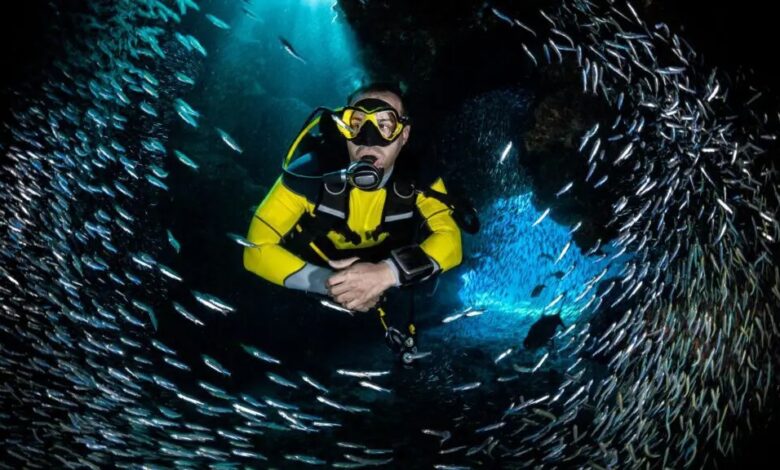Night Diving Tips: A Complete Guide for Safe and Thrilling Underwater Adventures

Night diving offers a unique experience, revealing the underwater world in a whole new light. While the daytime dive presents a familiar, well-lit environment, night diving introduces an element of mystery, excitement, and an entirely different set of challenges. If you’re planning your first night dive or want to improve your nighttime diving skills, this guide to night diving tips will provide you with the essential information you need for a safe and enjoyable experience.
What Makes Night Diving Different?
Night diving tips are essential because diving at night comes with its own set of risks and rewards. The underwater world behaves differently once the sun sets. Marine life, for example, often becomes more active after dark, and some creatures, like nocturnal predators, emerge from their daytime hiding spots. On the other hand, visibility is much lower, and the absence of natural light can make navigation challenging.
Understanding the importance of preparation and taking necessary precautions is crucial for a successful night dive. In this article, we’ll cover everything you need to know, from essential gear to safety measures, to help you have the best possible experience.
1. Essential Gear for Night Diving
Dive Lights: Your Lifeline
The most critical piece of equipment for night diving is a reliable dive light. Since visibility underwater is limited after dark, having a bright and durable light is vital. Choose a light that offers a wide beam, which helps you illuminate the surrounding area and spot marine life easily. It’s a good idea to have a backup light, as your primary light might fail during the dive.
Wet Suit and Accessories
Wearing the right dive suit is crucial for comfort and safety during a night dive. A wetsuit or drysuit that suits the water temperature will help maintain body warmth. Since visibility is low, wearing gear with reflective strips or bright colors will help your buddy easily spot you in the dark.
Dive Computer and Compass
During night dives, navigation becomes more challenging. A dive computer can assist you in monitoring depth, time, and other essential dive parameters, helping to ensure you stick to your dive plan. Additionally, carrying a compass can assist with orientation and direction, as landmarks and natural references may not be visible at night.
2. Plan Your Dive Carefully
Know Your Site
Before your night dive, familiarizing yourself with the dive site is essential. Ideally, you should have already dived the location during daylight hours. This allows you to recognize any hazards or obstacles that might be harder to spot once the sun goes down. Discuss the plan with your dive buddy to ensure you both know the entry and exit points.
Stick to the Buddy System
Night diving can feel isolating due to the lack of visibility, which is why it’s especially important to follow the buddy system. Staying close to your dive buddy will provide reassurance, and if one of you encounters a problem, the other can help. Always communicate your dive plan and establish hand signals for easy communication underwater.
Establish a Dive Time Limit
To avoid running out of air or becoming disoriented, it’s essential to establish a time limit for the dive. Stick to a pre-planned dive duration and make sure you have enough air for the return trip. At night, time can pass quickly, and without clear references, you may lose track of time underwater.
3. Night Diving Tips for Safety
Keep Track of Your Air Supply
Maintaining awareness of your air supply is crucial when diving at night. It’s easy to lose track of how much air you have left when you’re focused on exploring or observing nocturnal creatures. Always monitor your air level and plan to head back to the surface with a sufficient safety margin.
Stay Close to Your Dive Boat
During a night diving adventure, it’s best to stay within a reasonable distance from the dive boat or shore. This ensures that you can return to the surface quickly if anything goes wrong. Also, when diving from a boat, be mindful of your position in the water so that you don’t get disoriented and lost.
Avoid Sudden Movements
Because visibility is limited underwater, sudden or erratic movements could disturb marine life and create unnecessary stress. Move slowly and deliberately while night diving, being mindful of your surroundings. Also, avoid using your dive light too erratically, as it can impair your vision and cause disorientation.
4. Be Aware of the Marine Life
Nighttime Marine Behavior
Marine life behaves differently at night. While daytime dives often offer opportunities to see fish and corals, night diving opens the door to observing nocturnal creatures like squids, octopuses, and certain fish species. These creatures are often more active at night, and with your light, you can reveal hidden behaviors that aren’t visible during the day.
However, some creatures might be more elusive or even aggressive at night. Be cautious when interacting with marine life. A well-placed light can help you identify a creature without startling it, allowing you to enjoy the encounter from a safe distance.
Don’t Touch the Marine Life
One of the most important night diving tips is to avoid touching marine creatures. Some species may appear to be docile, but they could be venomous or have sharp spines that can cause injury. Always observe marine life from a distance, and use your dive light to get a closer look without making contact.
5. Navigating the Night Dive
Use Your Light Effectively
One of the most crucial night diving tips is how to use your dive light. Pointing the light downward will illuminate the sand and allow you to see creatures like crabs and lobsters hiding beneath. If you shine the light in front of you, it helps you see larger fish and other marine life that might be swimming around. Remember not to shine your light into other divers’ eyes as it can disorient them.
Stay Calm and Be Aware of Your Surroundings
Night diving requires a higher level of awareness, especially when it comes to orientation. It’s easy to become disoriented in the dark, so it’s essential to remain calm and follow your dive plan. Practice slow and steady movements, and always know your direction.
Stay Close to Landmarks
Once you’re underwater, staying close to landmarks is a helpful night diving tip. If you’re familiar with the site, identify natural landmarks such as rock formations or specific underwater structures. These will act as reference points, ensuring you don’t get lost in the dark.
6. Additional Night Diving Tips for Beginners
Night Dive Briefing
Before entering the water, ensure that you and your buddy have a thorough briefing. Discuss how to use the light, the planned route, and potential hazards. A well-executed briefing ensures both of you are prepared for the challenges of night diving.
Practice Night Dives with an Instructor
If you’re new to night diving, it’s best to take a course or practice under the guidance of an experienced instructor. They can provide valuable insights and teach you essential techniques that will enhance your confidence and skills.
Keep It Short
For your first night dive, keep it short. Limit the dive to 20-30 minutes to build your confidence and get used to the darkness. Gradually increase the time as you become more experienced.
7. The Thrill of Night Diving
Night diving is an unforgettable experience. The calmness and solitude of the dark waters provide a sense of peace, while the beauty and diversity of marine life make every dive a unique adventure. By following the right night diving tips, you can dive with confidence, safety, and enjoyment.
In conclusion, night diving tips are essential for ensuring a safe, enjoyable, and memorable underwater experience. With the proper preparation, gear, and knowledge of marine behavior, you can dive into the depths of the ocean after dark with peace of mind. Always dive with a buddy, plan your dive carefully, and be mindful of your surroundings. With these tips in hand, you’ll be well on your way to discovering the magical world that only comes to life when the sun sets.




